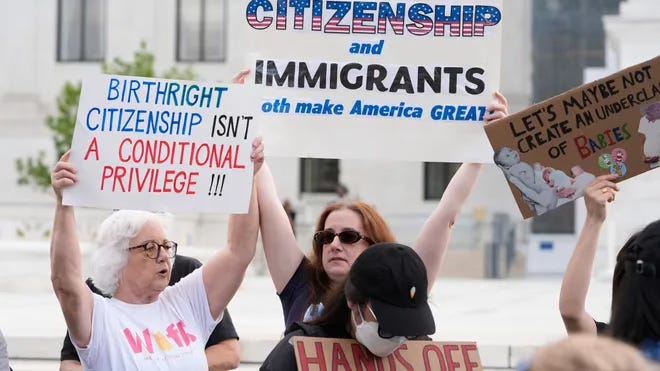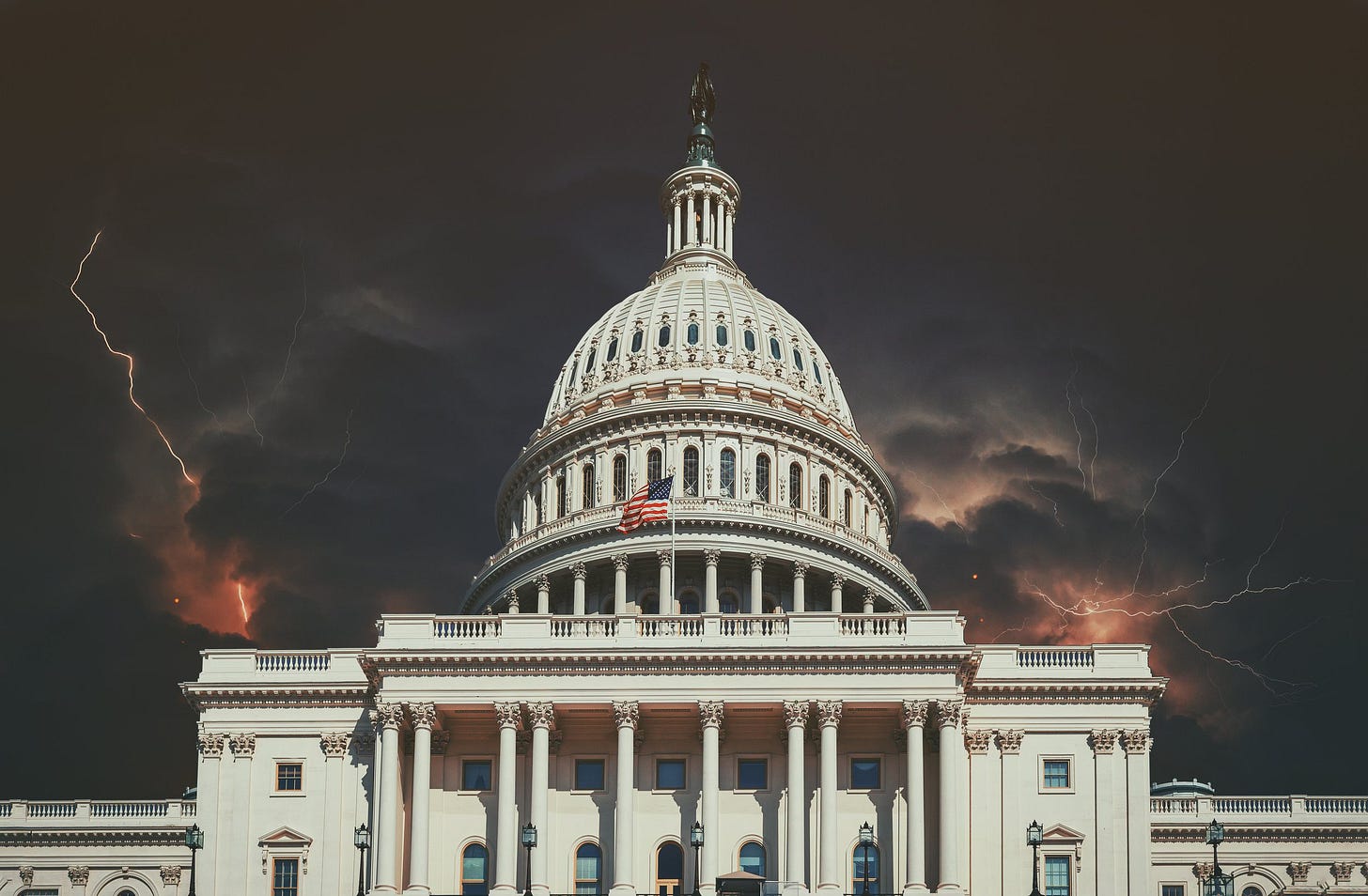Injunction junction, what's your function?
The American Constitutional Crisis just got a lot worse
What you’ll read about in this post:
The Supreme Court delivered a strange opinion today, regarding the ability of federal courts to issue nationwide injunctions. What does that mean and why is it a problem?
The Court missed an opportunity to do its job. Why do the legislative and judicial branches continually turn away from opportunities to assert themselves?
An American Constitutional crisis is deepening and we seem content to watch it all burn. What’s wrong with Americans?
“Ambition must be made to counteract ambition. … It may be a reflection on human nature, that such devices should be necessary to control the abuses of government. But what is government itself, but the greatest of all reflections of human nature?”
— James Madison
The Supreme Court handed the President a powerful weapon
The Supreme Court of the United States rendered a decision today in Trump v. CASA, Inc., the case regarding President Donald Trump’s executive order attempting to end birthright citizenship. I tackled this issue a few weeks ago, but the decision has bigger implications than just birthright citizenship.
When President Trump issued his executive order ‘ending’ birthright citizenship, political opponents immediately challenged it in federal courts. Attorneys initially filed for an injunction in the Western District of Washington. There, a judge granted the request for an injunction which provided a temporary ban on implementing Trump’s executive order. This merely means that the policy could not take effect unless the Supreme Court ruled the executive order was constitutional. Blanket injunctions have been a common feature of the federal courts for over 100 years. This allows for the government to keep a policy in place and not change until all challenges have been exhausted.
The Court declined to issue a ruling about the constitutionality of the executive order itself. That, in itself, is a judicial punt. The Court should have heard arguments on this matter and made a ruling as quickly as possible, lest the government establish a policy which violates the Constitution.
Instead, the justices ruled that universal injunctions exceeded the authority of federal courts. Justice Amy Coney Barrett wrote the opinion of the court, and highlighted that the nation lacked a true history of permitting wide-sweeping injunctions. Barrett highlighted a serious problem within the federal government.
In any instance where a president issues an executive order, political opponents file for an injunction because they simply do not like. It delays the implementation of policies of the president that likely do not violate the Constitution. Injunctions have become a tactic rather than a remedy. This also encourages potential litigants to ‘shop’ around for a friendly federal judge who will grant an injunction that applies to the entire nation.
Barrett noted that in the first 100 days of the second Trump administration, federal district courts have issued more than 20 injunctions halting policy implementation. While this is a valid point, it’s also entirely within the realm of possibility that this administration continually pushes the boundaries of constitutionality with its actions.
Trying to prevent a log jammed federal court system and preventing wild policy decisions from taking effect is a delicate balancing act in any era of American history. In the current political climate, though, this is a dangerous decision from the Supreme Court. This decision allows a presidential administration the power to implement virtually any policy and slow-play the ultimate conclusion of its constitutionality.
Within the current framework of immigration, President Trump could have millions of Americans deported before the Supreme Court renders a final decision on whether his executive order violates the Constitution. Federal agencies could uproot American citizens and send them to a foreign nation (which they’ve possibility never entered). Even if the Supreme Court ruled that these individuals were indeed natural born citizens, what would happen to these individuals? This would disrupt every aspect of a person’s life. Would the federal government then pay to have them returned to the United States? Pay for lost compensation?
Let’s take this thought experiment a step further. What if President Trump or a future president issued an executive order which created a policy that criminalized any speech or conduct which criticized the president. Though we know this clearly violates the Constitution’s protection of Freedom of Speech, we would have to wait until someone challenged this policy in courts and then the Supreme Court would have to determine its constitutionality. Any president could wield an exorbitant amount of power under the Trump v. CASA, Inc. precedent. We should be terrified of this type of executive power. American colonists fought in the Revolution for this very reason. This is not hyperbole or wild rhetoric.
Have we moved beyond an imperial presidency?
The men who wrote the US Constitution separated government authority into three distinct branches distinctly to prevent one person or group from aggregating power. And more importantly, the legislative branch was always intended to be the most powerful of the three. Yet, since the latter portion of the 19th century, Congress and the Supreme Court have slowly ceded authority to the president.
In 2017, when Trump first took office, I thought that moment presented a unique opportunity for Congress to reassert itself as the premiere branch of federal power. It could have consolidated its strength against an inexperienced outsider. Instead, the Republican Party circled the wagons around Trump and his cult of personality. The political undertones at the time almost made it easy for them to follow the president. Why resist the easy path of following the ‘Trump train’ when he rewards supporters? Individual members of Congress could be easily primaried (see: Liz Cheney), but a block of powerful legislators (i.e. the late John McCain) could have done more to protect Congress as an institution.
Historian Arthur Schlesinger, Jr. coined the phrase “imperial presidency” to describe the Johnson and Nixon administrations for their heavy handed and often unconstitutional methods. The last decade has expanded on an already borderline imperial office. Trump’s unusual popularity among his base, his flurry of actions, and the inability or refusal of others to rein him in has led us to a Caesarian Presidency.
There’s a difference between the Johnson-Nixon era and Trump’s time in office. During Nixon’s tenure and after his presidency, Congress created legislation to curb his imperial tendencies. The War Powers Act, Budget and Impoundment Control Act, Federal Election Campaign Act, The Freedom of Information Act, and Ethics in Government Act were all passed to check the power of the president.
The 1970s also saw pushback from the Supreme Court, which delivered important decisions limiting the president’s power, including United States v. Nixon (the infamous Watergate tapes), New York Times v. United States (the Pentagon Papers & Vietnam), Senate Select Committee v. Nixon (also Watergate), and United States v. Mitchell (limiting executive privilege). Each of these rulings from the Court limited the power of the presidency and denied a crooked man from hiding his crimes.
Congress could take action and pass legislation which would specifically authorize federal courts to issue universal injunctions, but the Republican majorities in both houses have neither the courage nor the desire to pursue such a law.
Not everyone is walking the road to hell so willingly. One of the three dissenting justices in this case, Sonia Sotomayor, wrote a powerful statement regarding the danger of this decision:
“No right is safe in the new legal regime the Court creates. Today, the threat is to birthright citizenship. Tomorrow, a different administration may try to seize firearms from law-abiding citizens or prevent people of certain faiths from gathering to worship. … I will not be complicit in so grave an attack on our system of law …”
Sotomayor accurately clocked the grave reality that awaits us and the failure of the Supreme Court to check the president. She also took the majority to task for failing to address Trump’s executive order and its constitutionality. Sotomayor rattled off a litany of history and legal precedent that can only lead to the inevitable conclusion that the 14th Amendment guarantees birthright citizenship. Yet, the majority did not bother to address that matter.
Often, I’ve seen Chief Justice John Roberts as a leader of the Court who cares about the institution’s reputation and its role in federal scheme of government. Yet, he voted with the majority and presumably, during conferencing on the case, was able to exert some level of influence over the case. I’m disappointed that he didn’t step into the breach and bring some sanity to Washington.
The Crisis Deepens
Prior to the 2024 Election, President Trump faced charges in connection with his false claims about a ‘stolen’ 2020 Election. Trump used the power of his high office to conspire to obstruct the Electoral Vote count on January 6, 2021 and pressure election officials in states to declare him the winner. When the federal government pursued criminal charges against Trump, his attorneys argued that the president cannot be criminally liable.
In Trump v. United States, the Supreme Court sided with Trump, ruling that presidents received absolute immunity for the core powers of the office, and presumptive immunity for actions on the ‘outer perimeter’ of the presidents’ duties. It’s amazing how people have already forgotten the magnitude of this case and the fact that accountability does not exist for some individuals. Now, matters are worse.
The president can unilaterally create an unconstitutional policy, implement it, and hope the judiciary does not rule it unconstitutional. Even if it does rule against a presidential edict, the damage from the policy is already done and there will be no accountability for wreaking such havoc on a nation supposedly “of the people, by the people, and for the people.”
We live in an inflection point of American history, and our elected representatives, judges, and voters seem intent on allowing democratic institutions to fade away. We can still right the ship in this nation. America has weathered other crises, and worse ones.
A peculiar quirk of any nation is the willingness to accept limited freedoms or authoritarian leaders, provided there’s relative economic growth and a generalized sense of security. I believe we’re seeing this unfold in the United States. Most people are content to go about their daily lives as long as they have a place to live, food to eat, and a little bit of money in their pocket. We are tacitly participating in a give and take with the government — and they’re currently taking.
The Covid-19 pandemic presents a good case study in how quickly people will turn on an administration. For all of Trump’s faults, we cannot blame him for the Covid outbreak. It was beyond his ability to stop. This didn’t stop Americans from voting him out of office in 2020. The economic fallout from the pandemic cost him an election. Am I oversimplifying? I don’t think so. In any given presidential election, the economy is always one of the top three factors in determining how people vote.
For a more extreme case, take a look at Syria prior to 2011. From 1970 to 2000, Hafez al-Assad ruled the Middle Eastern nation in a brutal capacity. He tolerated no political dissent, used a secret police force to enforce the law and arrest enemies, and ruthlessly tortured and killed those who did not comply. His son, Bashar al-Assad, continued in the same manner. Syrians did not revolt, however, until 2011. For decades, they tolerated the repression because of modest economic progress. When that progress declined, and wealth inequality increased, the people would no longer tolerate it.
We are ignoring the harsh reality of an authoritarian leader who continually encroaches on the important boundaries of power set by the Constitution and generations of Americans before us. We ignore this cancer because we are comfortable. The complacency of average Americans will do more to harm this nation than any foreign threat.



